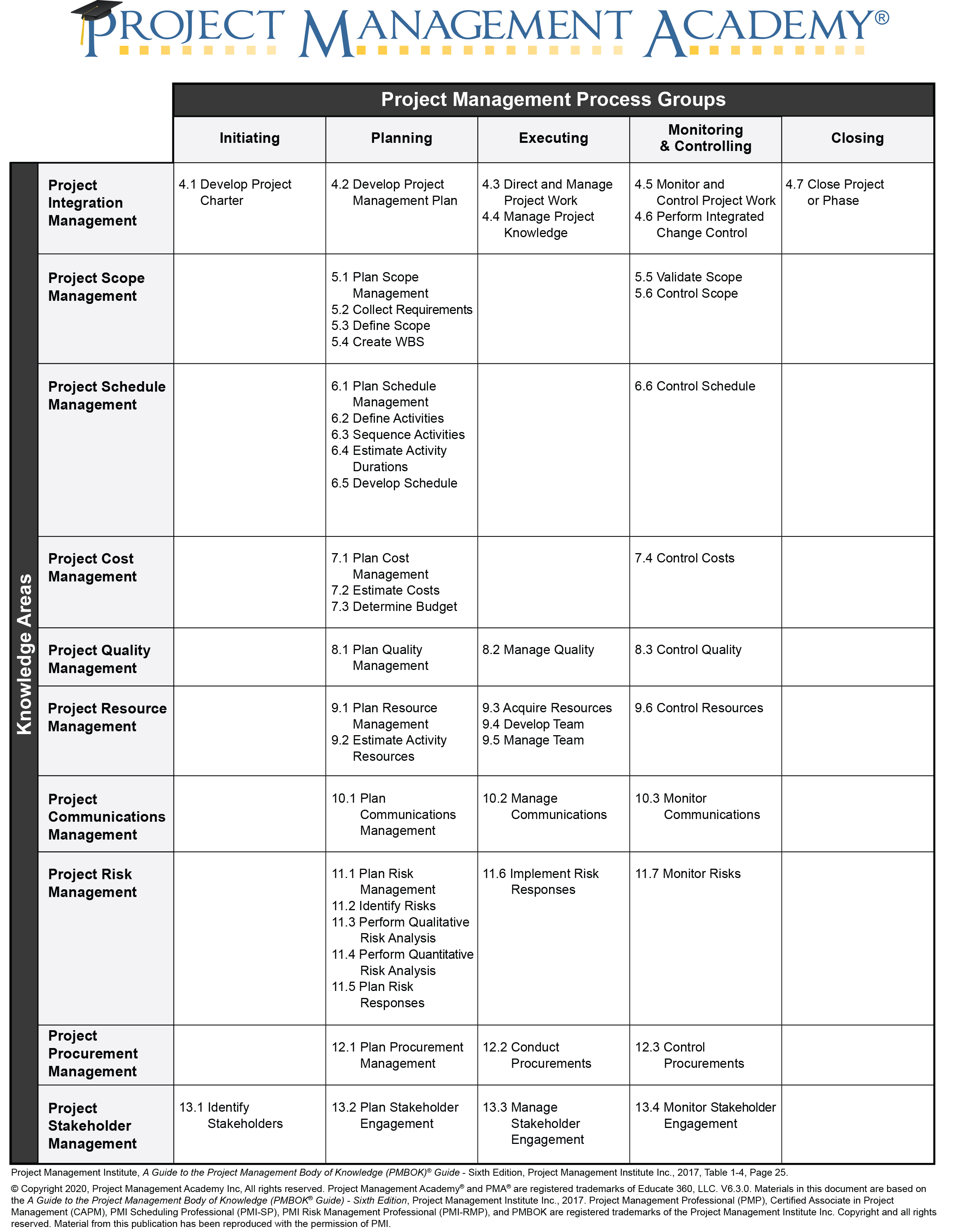Are the knowledge areas still relevant for the new PMP exam? PMI recently updated the exam, and some familiar concepts might seem like they’ve disappeared. But here’s the thing: even though the exam now focuses on three domains with tasks, enablers, and tools, the information about process groups and knowledge areas is still important.
That’s where the experts at Project Management Academy come in. They can help you better understand the knowledge areas and how they relate to other essential project management knowledge. By getting a grasp on this, you’ll be ready for the updated PMP exam and modern project leadership too.
On this page:

Free Download:
The Ultimate Data Quality Guide
Learn about the 7 data quality
tools every project manager
should know!
10 Knowledge Areas on the PMP Exam
The PMBOK Guide, a comprehensive resource for project managers, covers ten interrelated knowledge areas that are essential for successful project management. These areas span from planning to closing a project. They provide guidelines, tools, and techniques to help project managers navigate complexities effectively.
The 10 knowledge areas cover the essentials of effective project management. They show what you need to know to pass the PMP exam and be a better project manager. Understanding and applying these principles can help you improve your skills and make better decisions. This increases your chances of delivering projects on time, within budget, and to the satisfaction of stakeholders.
No matter your experience or industry, mastering these knowledge areas is crucial for success in project management.
| Knowledge Areas | Definition | Example |
|---|---|---|
| Project Integration Management | Manages project tasks end-to-end, aligning with organizational goals. | Combining project plans, objectives, and deliverables into a single project management plan. |
| Project Scope Management | Defines, validates, and controls project scope to meet objectives. | Creating a work breakdown structure (WBS) to outline project tasks and deliverables. |
| Project Schedule Management | Creates and maintains schedules, manages timelines, and adjusts as needed. | Developing a Gantt chart to map out task timelines and dependencies. |
| Project Cost Management | Develops, monitors, and controls the budget to ensure cost alignment. | Estimating costs for resources, labor, and materials, then tracking actual spending against the budget. |
| Project Quality Management | Plans, controls, and assures quality, ensuring deliverables meet standards. | Implementing a quality assurance process to review and test deliverables before final acceptance. |
| Project Resource Management | Manages team and materials, covering estimation, acquisition, and control. | Assigning team members to tasks based on their skills and availability, and managing resource allocation. |
| Project Communication Management | Ensures effective communication, keeping team and stakeholders informed. | Setting up regular status meetings and project reports to keep stakeholders updated on progress. |
| Project Risk Management | Identifies, analyzes, and monitors risks, planning responses. | Conducting a risk assessment to identify potential project risks and developing mitigation strategies. |
| Project Procurement Management | Integrates and manages external resources like contractors. | Drafting contracts for vendors, managing vendor performance, and closing contracts after deliverables. |
| Project Stakeholder Management | Identifies and manages stakeholder expectations, ensuring effective communication. | Creating a stakeholder analysis to understand their interests and influence, and planning communication strategies. |
Studying for the PMP Exam?
Memorizing the Knowledge Areas for the PMP Exam
With so many knowledge areas, tasks, and details, memorizing and applying the information can seem daunting. However, mnemonic devices can help you remember the ten knowledge areas more easily. We suggests a few clever sentences where each word represents a knowledge area.
For example: “I Saw Single Chickens Quietly Receiving Coffee Reading Poetry Silently.” The first letter of each word corresponds to a knowledge area, making them more memorable.
Feel free to create your own sentences or use other memorization techniques that work best for you. Additionally, flashcards, writing, songs, and other strategies can contribute to your success. Keep in mind that the updated exam focuses more on applying knowledge to analyze and resolve project situations. While memorization is still necessary, a deeper understanding of the material is crucial for certification.
Relevance of Knowledge Areas in the Updated PMP Exam
In the latest version of the PMP exam, updated in early 2021, the main focus is now on three domains and various tasks, enablers, and tools. But as we said, this doesn’t mean the 10 PMP knowledge areas and 5 process groups have vanished completely. Instead, this “old” information now exists as a subset of the three new domains:
- People
- Process
- Business Environment.
The knowledge areas and process groups are mostly part of the Process domain, but they’re represented in all three domains. Understanding the knowledge areas and process groups will help you grasp the natural flow of projects through the project lifecycle. It will also help you understand the overarching principles and processes you go through during a project.
As a result, this will help you identify the right project documents, tools, and techniques to address various conflicts and situations.
The Relationships Between Process Groups & Knowledge Areas
The project lifecycle consists of five process groups: Initiating, Planning, Executing, Monitoring & Controlling, and Closing. These process groups are closely related to the ten knowledge areas found on the PMP Exam. The knowledge areas map to the different process groups and align with tasks under the new domains.
Refer to the knowledge areas chart below to understand the mapping between process groups and knowledge areas:

Understanding the different parts of project management and how they relate to the domains of People, Process, and Business Environment will help you know what resources to use and when. As we said before, memorizing will help with this exam, but it’s more important to be able to apply domains, tasks, enablers, and tools to exam situations correctly.
It’s also good to know that the updated PMP exam is split evenly between Agile and Predictive methods. The great thing about predictive project management is that it’s based on proven best practices and strategies for planning, analyzing, and anticipating risks. So, if you’re dealing with a conflict about resource use, you probably already have an approved project management plan.
When answering a question about Agile concepts, remember that servant leadership is key. Often, the answer that offers the closest thing to a “win-win” solution is the best choice, no matter the situation. Also, while Agile project management is flexible, it still includes planning, scheduling, and identifying key milestones. It also involves anticipating potential risks or blockers.
Therefore, by keeping these things in mind, you can choose the most appropriate answer in an Agile context.
Preparing for the PMP Exam: Knowledge Areas
Feeling overwhelmed by the changes to the PMP exam? Don’t worry, the knowledge and practices for good project management haven’t changed. The updated exam is designed to meet the need for more diverse project management skills and approaches. That’s why the new scoring system reflects this.
As a result, the knowledge areas aren’t as prominent in the exam as before. However, understanding the 10 PMP knowledge areas, project management process groups, and other information is still crucial to passing the PMP certification exam.
That’s where the experts at Project Management Academy come in. They can help you understand the PMP exam changes and how to apply critical project management knowledge, like the PMP knowledge areas, to the new domains of People, Process, and Business Environment.
To get all the guidance and resources you need to pass the PMP certification exam, sign up for our PMI-approved online or in-person PMP training courses.
Upcoming PMP Certification Training – Live & Online Classes
| Name | Date | Place |


 New Horizons
New Horizons
 Project Management Academy
Project Management Academy
 Six Sigma Online
Six Sigma Online
 TCM Security
TCM Security
 TRACOM
TRACOM
 Velopi
Velopi
 Watermark Learning
Watermark Learning
 Login
Login




 New Horizons
New Horizons
 Project Management Academy
Project Management Academy
 Velopi
Velopi
 Six Sigma Online
Six Sigma Online
 TCM Security
TCM Security
 TRACOM
TRACOM
 Watermark Learning
Watermark Learning